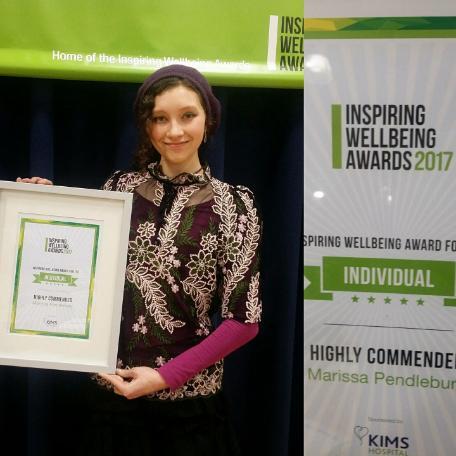SOCIAL isolation caused by Covid-19 has actually created safe havens for some people coping with an eating disorder.
And when lock-down ends, great care needs to be taken to ease these individuals back into society to avoid painful relapses.
That’s the view of former anorexia sufferer turned campaigner Marissa Pendlebury, a graduate and ambassador for Liverpool Hope University.
Some eating disorder charities have argued that the Coronavirus lockdown has heaped pressure onto sufferers, with Beat reporting a 73% rise in contact across all of their channels in May, compared with February.
But author and self-help expert Marissa, 28, says it’s important to remember that for a great many sufferers lockdown could have come at the perfect time.
It’s now crucial those individuals are given help when restrictions are fully lifted.
Marissa, founder of the Nourishing Routes programme, explains: “Covid-19 has crea ted a really complex picture - and likely not what you might think.
“Many of those with an eating disorder are clearly struggling at this time.
“Isolation associated with Covid-19 might have forced them to face their eating disorder in a negative way. It’s hard to escape intrusive thoughts and they might cave-in to using food as a coping mechanism, eating less or counting calories more because they’re physically moving less while stuck indoors.
“But it’s important to remember that we’re also hearing how many are also benefiting from the lockdown.
“Covid-19 has given them permission to relax, to take a step back. For some people it feels like the world is slowing down - and that’s a good thing.
“When you can’t go to the gym, don’t have to go to work, don’t have to go to university, don’t have to go for a run you make yourself do every morning, you can put in a better schedule to make sure you have all their meals and snacks in place.
“For students, predicted grades have alleviated a lot of the pressure of exams. If they’re living at home, they might be supported by their family.
“They might also be thinking, ‘I don’t need to wear makeup every day, I don’t have to wear things that make me feel acceptable to others, I can be myself. I don’t have to have a summer body because I’m here in my garden.’
“People are also starting to notice the beauty in the world, subconsciously taking the focus away from their own bodies.
“We need to remember that lockdown is a double edged sword. Many will be struggling, but social isolation could hopefully be a positive thing for others.”

Now efforts should be focused on supporting those with eating disorders when schools, workplaces and universities do open their doors, according to Marissa.
She says: “Institutions need to be mindful about the risk of eating disorder relapse post-lockdown.
“People will have been tuned-in to a slower pace of life. But when things return to normal they might develop a fervour of motivation to get back to work, especially if they feel they’ve not done enough.
“It’s like a pendulum - if you swing it one way it’s always going to swing back the opposite way really fast.
“But you want the pendulum to move slowly back into the centre. There needs to be a gradual easing back into normal life, rather than, ‘Let’s get back to work - look at everything you’ve missed!’.”
Universities need an ‘open forum’ where students can express concerns about their mental health, either confidentially or as part of an awareness group that meets weekly or monthly, according to Marissa.
Schools and universities should also implement teaching sessions on ‘self compassion and taking time to relax’.
According to charity Beat, atround 1.25 million people in the UK have an eating disorder and 75 per cent of those affected are female.
Meanwhile anorexia has the highest mortality rate of any psychiatric disorder.
It’s a disease that Marissa, from Warrington, Cheshire, is sadly all too familiar with.
Having studied for a degree in Public Health and Nutrition, followed by a Masters in Psychology at Hope, she says her struggles with anorexia began aged 13, as the pressure from choosing her school options mounted.
She ultimately spent months in hospital, having used food control as a ‘coping mechanism’ for stress.
And it was through studies at Hope she was actually able to unpick the psychology behind her illness, considering herself recovered around the age of 24.
Marissa, a former mental health worker and trained yoga teacher, reveals: “I found my feet through studying more about psychology.
“I realised that all my obsession with work, trying to get on the career ladder, was really not making me - or anyone else - happy.
“It’s not about creating structured meal plans for yourself or following a specific amount of calories to get well and put on weight.
“Ultimately it’s finding out who you are, what you enjoy, being able to laugh and cry and have a lot of different emotions, without trying to control the world at the same time.”

Marissa’s Nourishing Routes platform began life as a simple blog, but has grown to become a peer-to-peer support platform for anyone who’s developed an unhealthy relationship with food.
Crucially, it also represents somewhere else to turn for those faced with agonisingly-long waiting lists to see a specialist on the NHS.
When someone does present to their GP, they’re typically referred to a dietician, community mental health team or special community eating disorder service.
But some have to wait for as long as a year to get that appointment, depending on the Clinical Commissioning Group (CCG).
Marissa says: “I was able to see a dietician within seven weeks.
“That might sound a long time but other people can be waiting for months and months. I’ve heard of people waiting more than a year, or an average of six months, just for an initial assessment.
“By that point this person could be extremely unwell. And remember that it’s hard for people to even ask for help. Usually by the point they end up at their GP they’re already in a critical condition.”
There’s also the issue of National Institute for Health and Care Excellence (NICE) guidelines on what constitutes the need for clinical intervention.
Marissa adds: “Sometimes people don’t actually meet the criteria for anorexia in terms of their weight. And the doctor will say, ‘Come back when you weigh six pounds less.’
“Others have told me that their doctors have recommended they still exercise, maybe they go for a jog, and they put the energy from food restriction into physical activity - but that potentially just creates another problem!
“I don’t blame doctors or the NHS. The individuals who work there are extremely compassionate and understanding. It’s just the system as a whole, the way it functions in terms of who it prioritises, is quite flawed.
“And unfortunately that’s led to people passing away because they’ve not had that support. Or because they feel neglected, they have maybe decided to make themselves more ill in order to get help.”
Marissa wants to see the NHS branch-out into more holistic treatments, too, including a form of occupational therapy in order to allow those with eating disorders to regain their independence.
She adds: “Recovery is not just about food - it’s just 10 per cent of the journey.
“Recovery is all the other things they've missed out on, such as family life, relationships, social life, having a laugh, just being a teenager.
“You can’t get these things back but you can rediscover yourself however old you are, and that’s really important.”
To learn about Nourishing Routes, head here.
To learn about studying psychology at Hope, go here.



